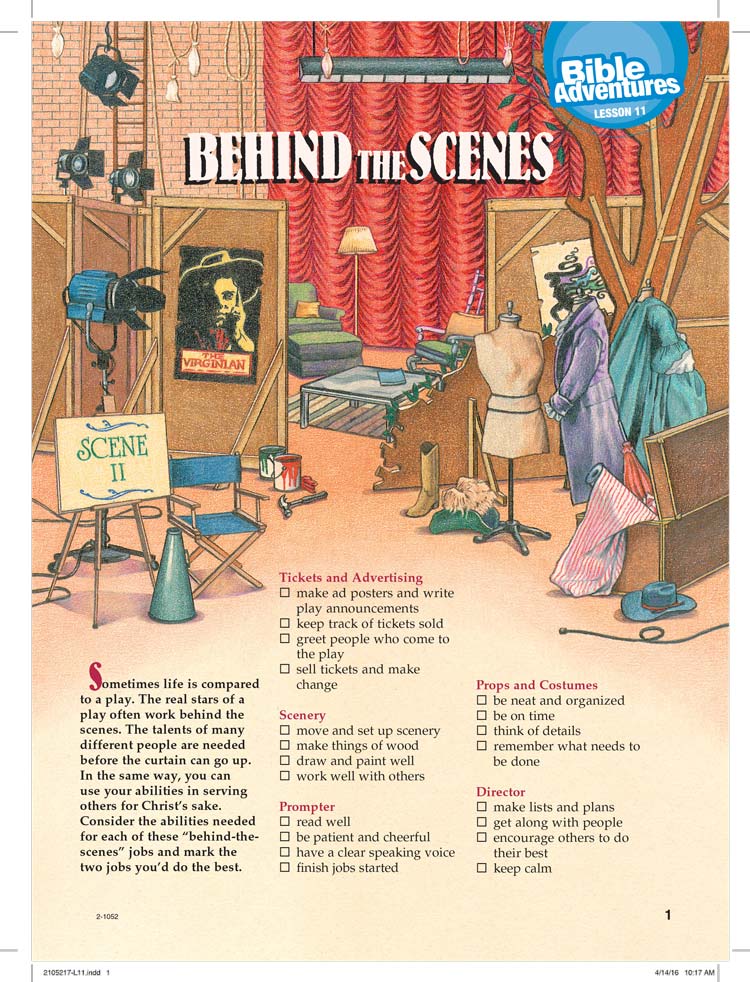Use this lesson outline to teach elementary students about Jesus’s parable of the talents found in the book of Matthew.
Editor’s Note: This lesson was adapted from Bible-in-Life, Upper Elementary.
SCRIPTURE: Matthew 25:14–29
FOUCS: We all have abilities to use for God.
Materials

- Bible Adventures sheet
- Pencils
- Bibles
- Index cards, whiteboard and marker
- Optional: 3″ x 5″ rectangles of nonseasonal gift wrap, stick-on bows
The Parable of the Talents Teacher Background
In teaching the disciples about the Kingdom, Jesus told this parable about a wealthy man who went on a trip and left his servants in charge of his money. Two of the servants used the money wisely and gained a profit for their boss. The third failed to do so, and he gained nothing. This servant was penalized while the others were rewarded.
It is interesting to note that the servants in Jesus’ story were rewarded on the basis of what they had done with what they were given. The reward was the same, even though one servant made more than twice as much money as the other (Matt. 25:21, 23). The man who hid his share of the money was punished because he played it safe, burying the money and not even earning interest.
This parable has become known as the parable of the talents. That title can be somewhat misleading. The term “talents” refers to weights of gold or silver, rather than a special ability. In this New Testament passage, the talent probably weighed approximately 50 pounds, though some scholars have suggested it may have been closer to 75 or even 90 pounds. Although accurate study requires clarification of the term “talents” used in the text, interestingly the modern meaning of the word fits the lesson also. In fact, the modern meaning of the word may have been drawn in part from this parable. Jesus’ point is that we are to do our best for the Kingdom with what we are given—money, abilities, time, intelligence—until His return.
Jesus’ point is that we are to do our best for the Kingdom with what we are given—money, abilities, time, intelligence—until His return.
Early Bird Options
Here are some suggested activities you can set up for preteens who arrive early. Both activities help students begin to explore their abilities.
Hobby Fair—Provide students with markers and butcher paper with the words “Hobby Fair” written at the top. Let kids list their hobbies or interests or draw pictures of themselves doing these activities.
Challenge Course—Set up three or four activity stations with simple directions posted at each. Some suggested activities: Count backward
from 50 to 1; recite the alphabet; alternate hopping on one foot and clapping for one minute; write one compliment for each of your family members (provide paper and pencils).
Connecting with God’s Word
To aid students in relating to this lesson on using our abilities for God, students will discuss the abilities they could contribute to a fictitious play
production.
MATERIALS: pencils, Bible Adventures sheet

In today’s Bible study from Matthew 25:14-29, your students will discover from the parable of the talents that we all have abilities to use for God, and that God expects us to use them for His glory. To help your students bring their life experience into the lesson so that they connect with the Lesson Focus, lead them in the skill inventory activity that follows.
Explain to the class that they’re going to pretend that they’re putting on a play.

SAY: We’re going to take a look at what each of us might do to help with the play. The actors have already been cast, so we’re going to do the important behind-the-scenes jobs that are necessary to successfully put on a play.
Distribute pencils and the Bible Adventures leaflets to your students. Ask a volunteer to read the directions for “Behind the Scenes” on the bottom left-hand side of page 1. The students are to read each category of jobs (in red) and then use their pencils to check off the skill statements that they believe they could do or would like to do. Give the class several minutes to complete the skill inventory, and complete one yourself if you have an extra Bible Adventures on hand so that you can share your responses with the class.
Call for attention and have students report the skills they identified. You might want to read off each category and then have students raise their hands to identify the skill statements they checked off. Let students know which ones you selected.
Finally, ask students to choose one category listed (Tickets and Advertising, Scenery, etc.) that they would choose if they could participate in only one.
Discuss the following questions as a class:
- Do you think we have enough skills in our class to get our play produced? (If you have an exceptionally large class, you may have enough skills or interest to cover all jobs. But in most cases, you will find that some tasks would be left undone if you used only the students in your class.)
- What would we need to do if we couldn’t do all the jobs ourselves?(Students should be able to articulate that they’d need to seek out other people who had the needed skills to do the jobs they couldn’t do.)
- Can you think of people with the missing skills who could be asked to help? (Students will probably be able to name friends or family members who could take up the slack.)
SAY: As we discovered, many different talents and skills are needed to put on a play. This is also true of the kingdom of God: God’s people can use many different abilities and gifts to honor God and serve others. We need to decide whether we’ll use the gifts God has given us. In today’s lesson, Jesus told a parable about three servants who had to decide how they would use some talents of another kind that were entrusted to them.
Studying God’s Word
MATERIALS: Bibles
Have your students locate Matthew 25:16-18 in their Bibles.
SAY: Jesus told a story about three servants. The master put each servant in charge of an amount of money, known as talents. The master gave each servant the amount of money he knew the servant could take care of. And then he left on a trip.
Ask a volunteer to read Matthew 25:16-18 aloud from the Bible as the others follow along.
ASK:
- What amount did each servant have? (One servant was given five talents, another was given two talents, and the third servant was given one talent.)
- What did each one do with the money given him? (The first two servants put the money to work and doubled it; the third servant buried the money given him. Explain to your students that the servants had put the money to work by investing it or gaining interest on it. If some students have interest-bearing savings accounts, they should be able to relate to this statement.)
SAY: After a long time, the master returned. He called his servants together to see what they had done with his money.
Ask a volunteer to read Matthew 25:20-21.
ASK:
- This servant had been given much. What did he do with it? (He used it to earn just as much.)
- How did the master feel about him? (The servant had done a good job, so the master trusted him with more. The master had expected a return on his investment, and he got one.)
Ask a volunteer to Matthew 25:22-23.
ASK:
- How did this servant use the money given him? (He also invested it and doubled it.)
- What was his reward? (He was put in charge of more and was invited to share in his master’s happiness.)
- How were the first and second servants different? How were they alike? (The first servant was entrusted with more money than the second. But both doubled the money given to them, and both received the same praise from the master.)
SAY: Two servants used the money and made a profit for the master. The third servant did something else.
Have the students read Matthew 25:24-29 to themselves. Then ask the following questions based on those verses:
- What did the third servant do with his money? (He dug a hole in the ground and buried it.)
- Why do you think he did this? (He was afraid of the master.) Burying money was a common practice in Bible times. It protected the money, but it didn’t earn any interest.
- What advice might the other two servants have given him? (“Do what we did; at least put the money in the bank.”)
- How did the master feel about him? (Angry with him, disappointed. He called the servant wicked and lazy.) Point out that the master ordered that this servant’s one talent be taken away and given to the servant who was given five talents.
- Why do you think the master was so angry with him? (He didn’t use what was given to him. Instead, he just hid it away.) Some students may feel that the master was unfair to react this way to the third servant. After all, he didn’t lose or steal the money. Help your students understand that Jesus may have included the severe punishment in the story as a way to emphasize how important it is that we use our gifts and talents, and how displeased God is when we don’t use them.
- What kind of help-wanted ad might the master place to replace the servant who hid the talent? (Let students speculate and have fun with this. One possible ad would read “Help wanted: A servant who is trustworthy, hardworking, willing to use what’s been given to him or her, and knows about business investments.”)
- What do you think Jesus is trying to teach about the abilities He has given us? (Allow for discussion. We need to be willing to try things out and not be afraid; we should not hide our abilities. We should allow God to use them and let God help us develop them.)
Applying God’s Word
To help them take the lesson home with them, students will decide how they want to use their abilities for God and create a reminder of their decision.
MATERIALS: Index cards, whiteboard and marker; optional: 3″ x 5″ rectangles of nonseasonal gift wrap, stick-on bows
Be sure to give your students a few minutes to tidy up their various activity areas and put away any supplies they may have used. When they are finished, bring the group together again.
SAY: In our Bible study today, we saw how pleased the master was when his servants used the talents he’d placed in their care to earn money. God has placed talents of a different kind in each of our lives for us to use for Him, too. Each of us must decide if we’re going to use our gifts for Him, and how to do that.
Each of us must decide if we’re going to use our gifts for God, and how to do that.
Some of your students may not feel as if they have any talents at all, while some might have inflated ideas of what talents they have. Stress the idea that God has given everyone, without exception, some special quality, talent, or gift to use to honor God and bless others.
Ask students to list any talent or gift that they can name (not just ones they believe they have). Write these on the board as they are listed. Encourage students to think beyond the typical church setting to include business, the arts, and other areas. Feel free to add or suggest abilities that students don’t mention.
Give an index card or gift-wrap rectangle to each student (if you prefer, you may mount the gift wrap on index cards to make it sturdier). On the blank side of the card or wrap, have each student write down one talent from the board that they have or think they have and fold it in half like a greeting card. If they would like to use that gift to honor God, have them write a short prayer on their wrap. If you’d like, you may pass out stick-on bows for students to attach to their notes.
Gather your students and close in prayer, thanking God for giving us all special gifts to use for Him, and asking God to honor your students’ desires to use those gifts and abilities for His glory.

Seeing God throughout the Week:
Encourage students to ask God to show them ways they can use their talents to honor and serve Him. Invite them to talk with a family member or friend to get ideas of how, when, and where they might use their talent.
Need more parable lessons? We’ve got you covered!
Did you enjoy this lesson? It was adapted from Bible-in-Life for kids. To learn more about this curriculum, check out the video below or visit BibleinLife.com.
Explore every age level at BibleinLife.com!






